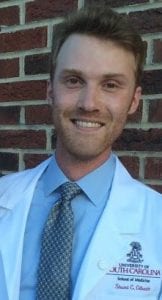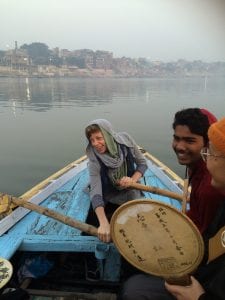Patricia Williams Lessane was featured in the 2018 President’s Report! Check out the full report HERE!
Category Archives: Uncategorized
Podcast with Mari Crabtree
Check out the podcast by Michael Overholt as he talked with Mari Crabtree (Assistant Professor in African American Studies) about her film festival “Afrofuturism on Film.”
Fall 2018 AAST Newsletter
Professor Sami Schalk to Deliver the 2018–2019 Conseula Francis Emerging Scholar Lecture
 The late Conseula Francis (1973–2016), the former director of the African American Studies Program, was deeply committed to mentoring and supporting junior faculty, and one of the many ways in which she championed the work of junior scholars in the field of African American Studies was to establish the Emerging Scholar Lecture Series. We still feel the loss of Conseula every day, and to commemorate her unflagging commitment to our program and to the work of junior scholars, we have named this lecture series in her memory.
The late Conseula Francis (1973–2016), the former director of the African American Studies Program, was deeply committed to mentoring and supporting junior faculty, and one of the many ways in which she championed the work of junior scholars in the field of African American Studies was to establish the Emerging Scholar Lecture Series. We still feel the loss of Conseula every day, and to commemorate her unflagging commitment to our program and to the work of junior scholars, we have named this lecture series in her memory.
This year, Sami Schalk, an assistant professor of Gender and Women’s Studies at the University of Wisconsin-Madison, will deliver a Conseula Francis Emerging Scholar Lecture on September 10, 2018. She published her book, Bodyminds Reimagined: (Dis)ability, Race, and Gender in Black Women’s Speculative Fiction with Duke University Press in 2018, and her lecture will draw upon the main arguments put forth in that project. Her research traces how black women’s speculative fiction complicates the understanding of bodyminds—the intertwinement of the mental and the physical—in the context of race, gender, and (dis)ability. Bridging black feminist theory with disability studies, Professor Schalk demonstrates that this genre’s political potential lies in the authors’ creation of bodyminds that transcend reality’s limitations. Outlining (dis)ability’s centrality to speculative fiction, Schalk shows how these works open new social possibilities while changing conceptualization of identity and oppression through non-realist contexts. Her other publications include articles in Disability Studies, African American Review, Palimpsest, the Journal of Modern Literature, and the Journal of Popular Culture, among others. Professor Schalk’s lecture is titled “Black Women’s Speculative Fiction and the Deconstruction of Able-Mindedness” and will be held at 6:00 pm in Addlestone Library Room 227.
Russian Studies Alumna Deniz Houston interns at the World Cup in Russia
Where are they now? Capers Rumph ’09 (German and History)
When German and History double major Capers Rumph received the outstanding German student award in 2009, the German faculty noted that she was a “poster child for our mission at the school of Language Cultures and World Affairs: she studied a specific language and culture, German, but used that cultural encounter as a springboard to become a responsible and engaged world citizen.”
We caught up with her recently to hear what she has been doign since graduation, and were not in the least surprised that she continues to be an inspiring Paradebeispiel (paradigmatic example) of our misssion here in LCWA. Capers, we are so proud of and inspired by you!
What have you been doing since you graduated and what are you up to now?
Since graduating, I’ve had the privilege of working and/or traveling in 50 countries, sailing across the Atlantic, advocating for an end to the war in eastern DR Congo, managing an ethical textiles company in Ghana, learning to grow vegetables on a farm that is working to dismantle racism in the food system, photograph trips to Burma, India, Sri Lanka, and Japan with a group of radical peace activist Buddhist monks, and a handful of other interesting things.
Right now, I’m living in Portland, Oregon, balancing my time between farming, construction work, resisting the rise of fascism, and making art.
How did studying German in the School of Languages and World Affairs prepare you be a global citizen?
Studying German taught me how to learn a language. It was my first second language, and the experience laid the groundwork to add third and fourth (and hopefully more eventually!) languages to the mix. I think that being able to communicate with people across languages and cultures is an invaluable skill — and this being able to understand/converse with people has taught me to trust people and has fundamentally shaped one of my core beliefs that, “people are good”. This understanding, which for me came by way of “learning how to learn a language,” is essential to contributing to the de-escalation and redirection of the ignorance fueled polarization, fear mongering, and general slide into plutocratic fascism that marks this moment in history.
For more on Capers’ journey and her photography, see her website: www.theoppositeofwar.com
German program alumna Dona Totova Lacayo featured in CofC magazine
Dona Totova Lacayo ’05, the chief commercial and public affairs officer at the Port of Hueneme (wy-NEEM-ee) in California, minored in German along with her major in International Business at CofC and enjoyed courses with Herr Della Lana and Dr. Baginski during her studies. She is featured in this summer’s edition of CofC’s magazine (see below) and we followed up with her to ask what role German has played in her many career successes.
Her response: “The German minor at the College of Charleston has given me the confidence and ability to use the language on business trips to Germany and while working with clients and business partners that also use the language. Knowing the German language has been extremely helpful throughout my career, connecting with people is key to continued collaboration and great business relationships.”
Congratulations on all of your successes Dona, and we look forward to following your career as it arcs ever upward!
CofC Magazine interviews Dr. Irina Erman, Director of Russian Studies
German and English Major Jake Keim interns at German newspaper (and receives a very sweet first assignment!)
This summer, German and English double major Jake Keim ’19 is interning in journalism at the Frankfurter Neue Presse in Frankfurt am Main as part of the CofC Cultural Vistas Summer Internship in Germany program. His first assignment was a sweet one: a review of the Cereal Culture Cafe in Bornheim. Read Jake’s entertaining narrative of his 5-course sugar bomb experience in German and in English below!
We let our American intern try the new Cereal Café in Frankfurt-Bornheim
German as an advantage in medical school applications: Stuart Gilreath ’14 looks back
Does studying German and interning and Germany really help Science majors in their med school applications and careers? We recently caught up with CofC alum Stuart Gilreath ’14, currently a medical student at the University of South Carolina, to ask about his experience as a minor in German at CofC and intern at a hospital in Germany through our Cultural Vistas Summer Internship program.

Stuart Gilreath ’14 (Biology and German, Honors College), currently in med school at the University of South Carolina.
“During the summer of 2012 I enrolled in the Cultural Vistas Summer Internship program alongside a handful of other students. This program provides a wide variety of internship opportunities. Members of my group were awarded internships in business, publishing, sports management, art management, chemistry, and healthcare. My internship took me to the Chirurgische Klinik und Poliklinik TU, München, where I shadowed surgeons and medical students. Beyond simply shadowing, some of my other tasks included holding retractors during surgery and assisting with wound dressing (under supervision, of course).
Over the course of the summer my German skills improved significantly, and I was provided the opportunity to gain valuable hospital experience while living in Munich, a beautiful and navigable city with everything you expect in a German city: outstanding public transit, beautiful parks, excellent food, and great beer. As a bonus, this internship program looked great on my medical school applications. Almost every single one of my medical school interviews started with a question about my summer at a “hospital in…Germany??”
Studying German has benefited me academically and professionally. I found it to be a culturally enriching addition to an otherwise primarily science-oriented education. All my professors were enthusiastic and supportive, and found entertaining ways to practice the language, such as composing character monologues to perform for the class or writing narrative papers. I would strongly encourage anyone interested in foreign language or experiences abroad to consider German!”



